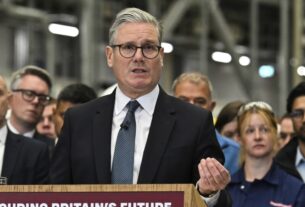WASHINGTON – As tensions continue to rise between India and Pakistan, US Vice President JD Vance on Thursday made a candid statement that while America hopes for peace, the conflict is ultimately “not our war.”
Speaking in an interview on Fox News’ The Story with Martha MacCallum, Vance emphasized the limits of American influence in the region.
“We hope this situation de-escalates quickly — that’s what any responsible nation should want,” Vance said. “But these are sovereign countries. We don’t control them, and frankly, we can’t.”
His remarks came as fighting between the nuclear-armed neighbors intensified for the second straight day. Drone attacks were reported by both sides, and nearly four dozen lives have been lost since the violence flared up again. Islamabad’s defense minister has warned that retaliation is “increasingly certain,” signaling more turbulent days ahead.
The current hostilities began on April 22, after an attack in Indian-administered Kashmir killed 26 civilians. India has blamed Pakistan-backed militants for the massacre, a charge Pakistan has firmly denied, calling instead for an impartial international investigation.
Vance, reflecting a growing realist tone in Washington, said, “We’re not going to step into the middle of a war that doesn’t directly concern us. Our focus is on urging calm, but we must recognize our limits.”
Despite this hands-off stance, the US hasn’t been silent. Behind the scenes, high-level talks are ongoing. Secretary of State Marco Rubio spoke Thursday with both Pakistan’s prime minister and India’s foreign minister, encouraging dialogue and restraint.
India remains a critical partner in America’s strategy to balance China’s growing influence, while Pakistan, although less central since the US withdrawal from Afghanistan, still holds diplomatic weight.
Former diplomats and analysts say the US is currently stretched thin with its commitments in Ukraine and Gaza, leaving it less likely to exert pressure early in South Asian conflicts.
Even former President Donald Trump weighed in this week, calling the rising hostilities “a shame,” and urging both countries to “stop now” before the situation spirals further.
As global eyes turn to South Asia, the US message remains clear — it hopes for de-escalation, but will not step into the fray. “Our hope and our expectation,” said Vance, “is that this doesn’t become something bigger — or worse, nuclear.”




